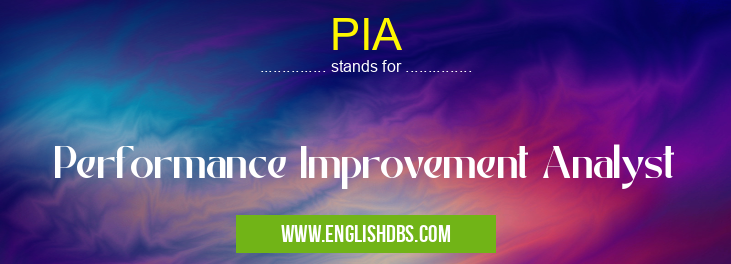What does PIA mean in HEALTHCARE
PIA stands for Performance Improvement Analyst. A Performance Improvement Analyst is a professional who helps organizations evaluate and improve their operational performance, identify and analyze problems, and recommend solutions. This role typically works with the organization’s executive management team to ensure that organizational objectives are met. It is important for all organizations to continuously measure and monitor their performance in order to stay competitive in their respective fields. The role of a Performance Improvement Analyst is essential in helping organizations make informed decisions that will help them reach their goals and achieve success.

PIA meaning in Healthcare in Medical
PIA mostly used in an acronym Healthcare in Category Medical that means Performance Improvement Analyst
Shorthand: PIA,
Full Form: Performance Improvement Analyst
For more information of "Performance Improvement Analyst", see the section below.
» Medical » Healthcare
Essential Questions and Answers on Performance Improvement Analyst in "MEDICAL»HEALTHCARE"
What is a Performance Improvement Analyst (PIA)?
A Performance Improvement Analyst works to identify and target areas of business processes where performance can be improved. As a PIA, you work to understand current performance levels and identify areas that need further improvement in order to increase efficiency, productivity, cost reduction and compliance.
What qualifications are required of a PIA?
Generally speaking, a good understanding of operations management is beneficial for any analyst in this field. Additionally, working knowledge of data analysis tools and techniques such as statistical process control or software analytics can also help. Other qualifications may include strong problem-solving skills, organization/prioritization skills, and communication abilities.
What kind of tasks does a PIA typically perform?
As part of their role as an analyst, the PIA would typically be responsible for gathering data and conducting data analysis to identify trends and inconsistencies with existing processes or systems. They may also need to present their findings to management or other stakeholders in order to drive improvements forward. Additionally, they will often need to develop action plans from their findings which include measurable goals for improving performance.
How does a PIA work with the team?
PIAs tend to collaborate closely with both teams within an organization as well as any external parties who contribute information or insights needed for analysis. This could involve building relationships with different stakeholders in order ensure all relevant data is collected accurately and efficiently throughout the process. Therefore it's important that PIAs have strong interpersonal skills in order to effectively communicate findings or set objectives related to improvement initiatives.
What kind of criteria should a Performance Improvement Analyst use when analyzing data?
When analyzing potential solutions or trends from gathered data, analysts should consider factors such as accuracy, relevance, timeliness and completeness while assessing alternative solutions based on risk/reward costs/benefits accordingly.
How successful can an organization become if it has a dedicated Performance Improvement Analyst?
Having an analytical expert like this on board can provide invaluable insight into your operations that could potentially save time and money while making processes more efficient overall. By focusing solely on improving existing processes rather than just reacting to problems or firefighting issues as they arise - organizations stand in better stead when it comes increasing overall performance levels.
Is there anything else I should know about being a Performance Improvement Analyst?
It's important not only for PIAs but personnel at every level throughout an organization - that everyone understands the importance of accurate reporting as this can directly impact decisions made concerning how best improve effectiveness across different activities. As much as possible - strive towards ensuring clarity concerning performance metrics in order that decisions made are informed by reliable source material.
What challenges do Performance Improvement Analysts face?
Some common obstacles faced by PIAs are lack of access to comprehensive real-time data needed for testing assumptions or gaining meaningful insights into areas requiring improvement. Also due the dynamic nature of most industries meaning by the time you have identified certain issues related improvements could already be obsolete - resulting in wasted resources during implementation stages.
Are there any risks associated with Performance Improvement Analysts?
There could be some risk associated when introducing changes too quickly without having thought out all implications properly beforehand; such mistakes could result in system instability or downsides affecting customer service standards & experiences thus damaging brand reputation long term.
Final Words:
In conclusion, PIA stands for Performance Improvement Analyst which is an important role within any organization that looks towards achieving success by continuously monitoring its performance and making adjustments accordingly. This role involves identifying areas where change could benefit the organization’s operations as well as working with executive management teams to make sure objectives are met along with providing recommendations on how these processes can be improved upon further if necessary before measuring any progress following any implementation of strategies or changes made.
PIA also stands for: |
|
| All stands for PIA |
